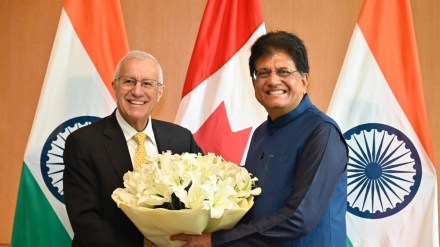India and Canada have agreed to resume negotiations on an ambitious Comprehensive Economic Partnership Agreement (CEPA), more than two years after the talks on the pact were suspended as political differences among two sides blew out in the open.
The decision to begin negotiations on CEPA was taken at a meeting between Prime Minister Narendra Modi and Canadian Prime Minister Mark Carney on the sidelines of the G-20 Summit in Johannesburg late Sunday.
What did Carney’s office say?
“Building on the 7th Ministerial Dialogue on Trade and Investment (MIDI) held in New Delhi, India, on November 13, 2025, the leaders agreed to formally launch negotiations for an ambitious CEPA encompassing goods, services, investment, agriculture and agri-food, digital trade, mobility, and sustainable development,” a statement issued by Carney’s office said.
Through the agreement both sides aim at doubling bilateral trade to $ 50 billion by 2030.
Goods and services between the two countries stood at $23.66 billion in 2024, with merchandise trade valued at nearly $8.98 billion,and the rest coming from services. In 2024-25 India’s goods exports to Canada were up 9.8% to $ 4.22 billion while imports from Canada fell 2.3% to $ 4.44 billion.
What did MEA say?
“Both sides reaffirmed their longstanding civil nuclear cooperation and noted the ongoing discussions on expanding collaboration, including through long-term uranium supply arrangements,” a statement by India’s Ministry of External Affairs said after the meeting between two Prime Ministers.
Modi also extended the invitation to Carney to visit India. In the earlier attempt at CEPA, talks were suspended after nine rounds of negotiations.
The negotiations on CEPA with Canada were first started in 2010 but could not make much progress. The negotiations were relaunched in March 2022 before being abandoned in August-September of 2023. The political differences arose due to activities of some of the extremists of Indian origin in Canada against India’s interests. Later Canada accused India of interference in its internal affairs. The differences grew to such a level that both sides withdrew their high commissioners and downgraded their diplomatic relations.
The repair of the breach started with the election of Carney as Prime Minister in March.
The first step was in June this year when Modi met Carney on the sidelines of the G-7 summit in Kananaskis in Canada. In October during the visit of Canadian Foreign Minister Anita Anand both countries reached a consensus on a ‘New Roadmap for India-Canada Relations’.
Despite the friction at the political level, India and Canada trade and investment ties continue to expand. Canadian pension funds are key investors in India’s infrastructure space.
Speaking at the Indo-Canadian Business Chamber on Monday after the announcement of CEPA talks, commerce and industry minister Piyush Goyal said Canada and India are natural allies. “We do not compete with each other. Actually complement each other. Strengths of India and strength of Canada can become a force multiplier for businesses and investors.”
He said there is a lot of potential in critical minerals, critical minerals processing technology cooperation between the two countries. “There is a good possibility on nuclear energy – particularly with our engagement with Canada on uranium supplies.”
“We can diversify our supply chains on both sides. We can focus on emerging technologies like artificial intelligenceI with data centres, quantum computing, machine learning, All new age technologies where India has very strategic benefits to offer for investors looking to leverage on the AI emerging technologies.”
Earlier this month after a two-year gap India and Canada resumed engagement under the Ministerial Dialogue on Trade and Investment (MDTI). “At the 7th ministerial conference last month we decided to reinvigorate the business contacts,” Goyal said.
“We need to really identify the focus areas. Critical minerals certainly could be one. Clean energy holds tremendous potential. Aerospace and defence capabilities is another area we should look at very seriously, and manufacturing in India under Make in India programme.”
In Johannesburg India, Canada and Australia also announced a new trilateral framework- the Australia-Canada-India Technology and Innovation (ACITI) Partnership to enhance cooperation in critical and emerging technologies.
